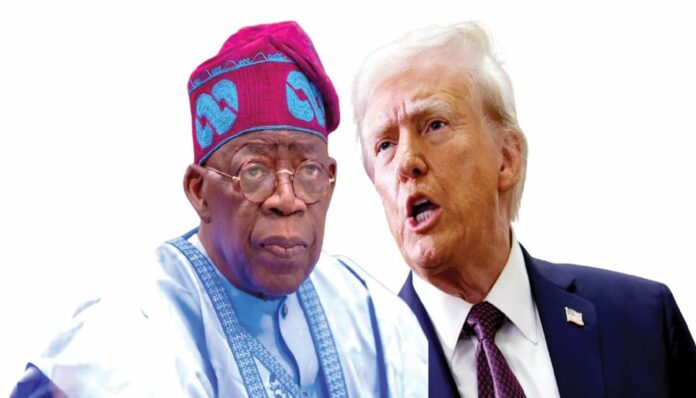WASHINGTON DC: Twelve northern governors, senior judges, and traditional rulers could soon face sweeping U.S. sanctions as Washington debates a new bill alleging complicity in what American lawmakers describe as “Christian genocide” and systematic persecution under Nigeria’s sharia and blasphemy laws.
The move follows U.S. President Donald Trump’s renewed classification of Nigeria as a Country of Particular Concern (CPC) and his directive to Secretary of State Marco Rubio to act immediately.
In a post on Truth Social on Friday, Trump expressed outrage over what he described as the ongoing killings of Christians in Nigeria.
He instructed Congressman Riley Moore, House Appropriations Committee Chairman Tom Cole, and other lawmakers to investigate and report swiftly.
Sponsored by Senator Ted Cruz, the Nigeria Religious Freedom Accountability Act of 2025 seeks to impose direct sanctions on public officials and religious leaders accused of promoting or tolerating violence against Christians and religious minorities.
If passed, the bill would compel the U.S. Secretary of State to, within 90 days, list Nigerian officials including governors, monarchs, and judges who have enforced or upheld blasphemy laws or ignored religiously motivated violence.
Sanctions under the Global Magnitsky Human Rights Accountability Act could include visa bans, asset freezes, and financial restrictions.
The bill highlights the expansion of Sharia law across 12 northern states including Zamfara, Kano, Sokoto, Katsina, Bauchi, Borno, Jigawa, Kebbi, Yobe, Kaduna, Niger, and Gombe since 1999, describing it as a legal framework that discriminates against Christians and violates international religious freedom standards.
Cruz argued that Nigeria’s leadership has institutionalized sharia law and enabled jihadist violence, citing the killing of over 52,000 Christians and the destruction of more than 20,000 churches since 2009.
In response, the Federal Government dismissed the allegations as misleading and politically motivated.
Through a policy note issued by the Ministry of Foreign Affairs titled Nigeria’s Constitutional Commitment to Religious Freedom and Rule of Law,the government insisted that Nigeria remains a multi-religious democracy governed by a secular constitution that prohibits state religion and guarantees freedom of worship.
The statement stressed that Sharia applies only to Muslims in specific northern states and only in matters of personal law, not criminal or civil cases involving non-Muslims. It noted that no federal law criminalises blasphemy, and that existing public order laws apply equally to all citizens, regardless of faith.
It added that Nigeria continues to prosecute terrorism and sectarian violence through its counter-insurgency framework and maintains compliance with international human rights treaties, including the ICCPR and the African Charter.
The government also criticised the U.S. draft as legally and factually flawed, saying it conflated federal, state, and religious legal systems into a single narrative that misrepresented Nigeria’s reality.
However, international rights advocates have raised concerns over human rights abuses tied to blasphemy accusations.
Cases such as the 2022 killing of student Deborah Samuel in Sokoto, the lynching of Usman Buda in 2023, and the 2016 murder of trader Bridget Agbahime in Kano have drawn condemnation over the impunity of perpetrators.
Trump, citing these attacks, warned that the U.S. would suspend aid and possibly take military action if Nigeria fails to stop the killings.
If the Nigerian Government continues to allow the killing of Christians, the USA will immediately stop all aid and may very well go into that disgraced country, guns blazing, Trump declared.
U.S. Secretary of War Pete Hegseth echoed the warning, stating that the Pentagon was preparing for possible intervention to protect Christians.
Presidential aide Daniel Bwala disclosed that President Bola Tinubu would meet with Trump “in the coming days to clarify the situation and discuss joint counterterrorism efforts.
He noted that both leaders share a commitment to ending terrorism and strengthening security cooperation.
Another presidential aide, Bayo Onanuga, said Tinubu had anticipated the U.S. backlash and had already directed Nigeria’s security chiefs to deliver results rather than excuses. The President reportedly told the military to smash new threats decisively, reaffirming Nigeria’s stance on freedom of belief and peace among all faiths.
Retired diplomats and analysts cautioned that a CPC designation could strain U.S.-Nigeria relations, reduce foreign aid, and slow security cooperation.
Former ambassador Mohammed Mabdul said it could hinder arms purchases and intelligence sharing, while Ogbole Amedu-Ode warned of possible isolation in international forums and reduced foreign investment.
Ambassador Godknows Igali urged diplomatic engagement, suggesting mediation through neutral countries, while foreign policy scholar Charles Onunaiju said the move was a “wake-up call” to strengthen governance and transparency.
Former Kano governor Rabiu Kwankwaso urged Washington to offer technology support instead of sanctions, arguing that insecurity affects all Nigerians, not just Christians.
He advised the Federal Government to appoint special envoys and ambassadors to engage directly with U.S. officials.
The Christian Association of Nigeria (CAN) welcomed Trump’s intervention as a call for Nigerian leaders to act decisively against violence, while the Muslim Rights Concern (MURIC) urged calm, interpreting Trump’s warning as targeting terrorist groups, not Muslims.
MURIC added that any U.S. strike should be restricted to Boko Haram and ISWAP fighters, warning against attacks on civilians or religious sites.
Former U.S. Mayor Mike Arnold accused the Sultan of Sokoto of failing to denounce jihadist killings, a charge dismissed by the Sultanate Council as baseless and divisive.
The Council reaffirmed its commitment to peace and national unity.
PDP chieftain Segun Showunmi, meanwhile, urged Abuja to take proactive diplomatic steps, warning that simultaneous application of the CPC designation and the Global Magnitsky Act could severely damage Nigeria’s global reputation and restrict international engagement for implicated officials.



